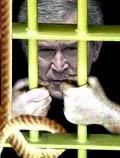| Find |
Thursday, 2 October 2008
What happens to Iraq veterans who speak out against the war?
On the fourth anniversary of the start of the Iraq War, in March 2007, Marines Adam Kokesh and Cloy Richards joined a group of other Iraq Veterans Against the War in a mock combat patrol in Washington, DC.
Wearing fatigues, a uniquely powerful symbol at a war protest, they pretended to arrest fellow protesters, throwing them to the ground, zip tying them, and leading them away. Other IVAW members passed out fliers explaining the guerrilla theater and noting that it wasn't sanctioned by the military.
Not long after, the two Marines, both of whom had served tours in Iraq, were notified that they were under investigation for potential violations of the Uniform Code of Military Justice. The code mandates that soldiers who wear uniforms at political events may be penalized with an "other than honorable" discharge, one step above a dishonorable discharge; they can lose health benefits and be forced to repay grants, including GI bill assistance.
The probe came even though technically, Kokesh and Richards weren't bound by the UCMJ at the time of the protest: They were part of the Individual Ready Reserves, a group of soldiers who've left active duty but still have time remaining on their eight-year military contracts. IRR status is mostly unpaid, and legally civilian.
Kokesh promptly fired off an email to his deputy commander, refusing to cooperate with an investigation he viewed as "political harassment." He wrote, "I am deeply offended by the attempt to keep me under the thumb of the organization to which I pledged my life and served so devotedly." The commander responded that Kokesh was being recommended for discharge; Kokesh, in turn, demanded a public hearing. At the hearing, in June 2007, with throngs of supporters and media standing outside the Marine Corps Mobilization Command in Kansas City, a panel of officers imposed a general discharge—the military equivalent of a C-minus report card, but with benefits intact.
For Richards, events unfolded differently. He had too much at stake to fight, having been recently diagnosed with 80 percent combat disability: He had sustained a brain injury during a mortar attack, was on the waiting list for knee surgery after an accident involving a cannon, and had attempted suicide multiple times due to severe PTSD. Upon learning of the investigation, he stopped wearing his uniform at protests. More
Posted at
16:10
![]()
Post Title: What happens to Iraq veterans who speak out against the war?
![[Zionazis-1.jpg]](https://blogger.googleusercontent.com/img/b/R29vZ2xl/AVvXsEg_x8DOGucgHQmfJJujuK_oYJdxhEnskhQqt-Og7lSk52HeaDQYzW8NQWfdpHmPgj_FJN0jJ3tz1prR1jVZHdHky2HDQxxcs4LVxX0DtAt3fG0sfRr6MDx7Sz8cJNjl0k0RS9TbCjangQ/s1600/Zionazis-1.jpg)




